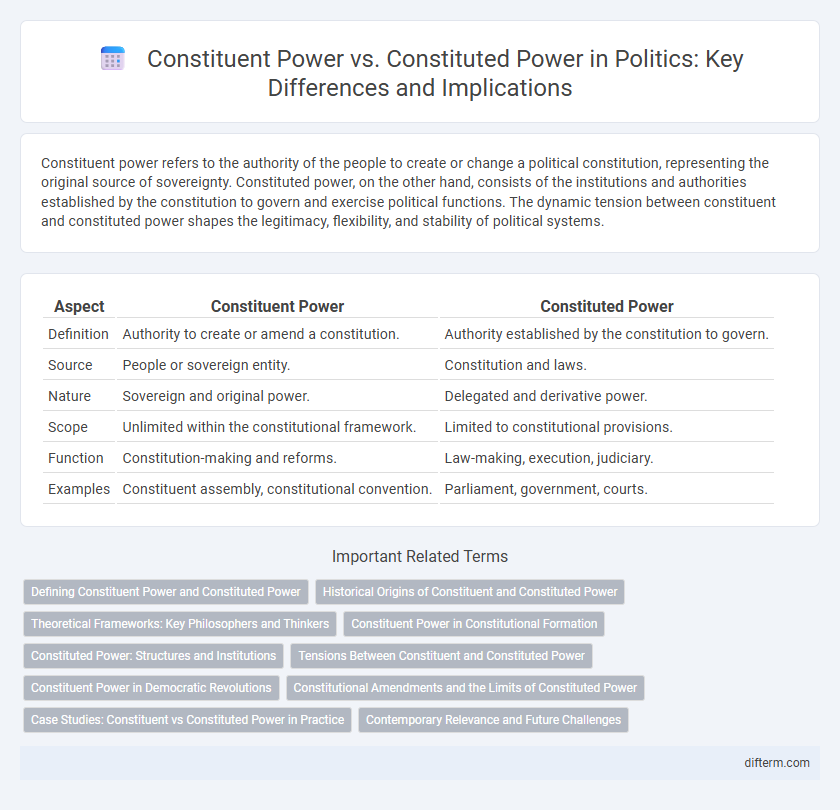Constituent power refers to the authority of the people to create or change a political constitution, representing the original source of sovereignty. Constituted power, on the other hand, consists of the institutions and authorities established by the constitution to govern and exercise political functions. The dynamic tension between constituent and constituted power shapes the legitimacy, flexibility, and stability of political systems.
Table of Comparison
| Aspect | Constituent Power | Constituted Power |
|---|---|---|
| Definition | Authority to create or amend a constitution. | Authority established by the constitution to govern. |
| Source | People or sovereign entity. | Constitution and laws. |
| Nature | Sovereign and original power. | Delegated and derivative power. |
| Scope | Unlimited within the constitutional framework. | Limited to constitutional provisions. |
| Function | Constitution-making and reforms. | Law-making, execution, judiciary. |
| Examples | Constituent assembly, constitutional convention. | Parliament, government, courts. |
Defining Constituent Power and Constituted Power
Constituent power refers to the fundamental authority vested in the people to create or alter a political constitution, representing the original source of sovereignty. Constituted power, on the other hand, denotes the established institutions and legal frameworks derived from constituent power, operating within the limits set by the constitution. Understanding the distinction highlights the dynamic between the active capacity for constitutional change and the passive exercise of authority within existing legal boundaries.
Historical Origins of Constituent and Constituted Power
The historical origins of constituent power trace back to the Enlightenment era, where philosophers like Rousseau emphasized the people's sovereign authority to establish government structures. Constituted power emerged as a legal mechanism to define and limit governmental authority, formalized through constitutions and laws following revolutionary moments such as the American and French Revolutions. This distinction reflects the foundational shift from absolute rule to popular sovereignty and constitutional governance in modern political theory.
Theoretical Frameworks: Key Philosophers and Thinkers
Constituent power, as theorized by Carl Schmitt, represents the original authority to create or alter a constitution, embodying the sovereign will of the people beyond established legal frameworks. Jean-Jacques Rousseau emphasizes the general will as the source of constituent power, foundational to legitimate political authority and democratic sovereignty. Hans Kelsen contrasts this by defining constituted power as the derivative legal authority granted by the constitution, operating within the confines established by the constituent power.
Constituent Power in Constitutional Formation
Constituent power refers to the original, sovereign authority vested in the people to establish or amend a constitution, serving as the foundational source of all legitimate political power. It operates outside existing legal frameworks, enabling the creation of a new constitutional order that reflects the collective will and sovereignty of the citizenry. This power is distinct from constituted power, which is derived from and limited by the constitution itself, emphasizing the pivotal role of constituent power in legitimate constitutional formation and democratic governance.
Constituted Power: Structures and Institutions
Constituted power refers to the established structures and institutions that operate within a political system, such as legislatures, executive bodies, and judicial courts. These entities exercise authority according to legal frameworks and constitutions, ensuring governance is conducted within defined limits and rules. Institutional stability and formalized procedures characterize constituted power, distinguishing it from the fluid and foundational nature of constituent power.
Tensions Between Constituent and Constituted Power
Tensions between constituent and constituted power arise from the conflict where constituent power represents the sovereign authority to create or amend a constitution, while constituted power operates within the boundaries set by that constitution. Constituent power is inherently revolutionary and unlimited, challenging the permanence and constraints of constituted power, which is legally and institutionally bound. This dynamic often leads to crises when emancipatory demands from the constituent power confront the rigidity and procedural limitations of constituted power structures.
Constituent Power in Democratic Revolutions
Constituent power in democratic revolutions represents the collective ability of the people to establish or radically transform the constitutional order, embodying the ultimate source of political legitimacy. This foundational power transcends existing institutions, enabling the creation of new legal frameworks and governance structures that reflect popular sovereignty. Democratic revolutions often harness constituent power to dismantle autocratic regimes, legitimizing the establishment of representative and accountable political systems.
Constitutional Amendments and the Limits of Constituted Power
Constituent power represents the sovereign authority to create or fundamentally alter a constitution, whereas constituted power refers to the established institutions operating within constitutional limits. Constitutional amendments exemplify the exercise of constituted power but must remain within the bounds set by the original constituent framework to preserve constitutional identity. Legal doctrines such as the "basic structure" in countries like India underscore the limits of constituted power, preventing amendments that undermine core constitutional principles.
Case Studies: Constituent vs Constituted Power in Practice
The 1787 United States Constitutional Convention exemplifies constituent power as delegates exercised the authority to create a new constitutional framework, contrasting with the established constituted power embodied by the Articles of Confederation that they replaced. Similarly, the French Revolution demonstrated constituent power in dismantling the Ancien Regime's constituted power structures and instituting a republic grounded in popular sovereignty. In modern contexts, South Africa's post-apartheid constitutional assembly showcased the transition from constituted power under apartheid to a new constitution reflecting the constituent power of a democratic majority.
Contemporary Relevance and Future Challenges
Constituent power remains central in contemporary politics as citizens increasingly demand direct influence over constitutional changes, challenging established constituted powers that govern day-to-day operations within legal frameworks. Emerging digital platforms and global interconnectedness amplify constituent power by facilitating participatory democracy, while constituted power faces challenges in maintaining legitimacy amidst calls for transparency and accountability. Future political stability hinges on balancing these dynamics, ensuring that constituted power adapts to evolving constituent demands without undermining institutional integrity.
constituent power vs constituted power Infographic

 difterm.com
difterm.com